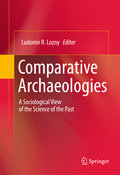
Comparative archaeologies: a sociological view of the science of the past
Lozny, Ludomir R.
Archaeology, as with all of the social sciences, has always been characterized by competing theoretical propositions based on diverse bodies of locally acquired data. In order to fulfill local, regional expectations, different goals have been assigned to the practitioners of Archaeology in different regions. These goals might be entrenched in local politics, or social expectations behind cultural heritage research. This comprehensive book explores regional archaeologies from a sociological perspective—to identify and explain regional differences in archaeological practice, as well as their existing similarities. This work covers not only the currently-dominant Anglo-American archaeological paradigm, but also Latin America, Western and Eastern Europe, Asia, and Africa, all of which have developed their own unique archaeological traditions. The contributions in this work cover these 'alternative archaeologies,' in the context of their own geographical, political, and socio-economic settings, as well as the context of the currently accepted mainstream approaches. Applies sociological methods to the study of Archaeology. Case studies of 22 countries. Creates a common framework for comparing archaeological approaches across country and cultural lines. Vital source for archaeologists to understand how archaeology is performed all over the world. INDICE: Preface.-Introduction. Archaeology in the age of globalization: local meanings, global culture.-Part I. Archaeology in Europe. Toward a Historical Sociology of German Archaeology. A Social History of Danish Archaeology.-Being Through The Past:Reflections on Swedish archaeology and heritage management.-Oscillations between the national and the international: The case of Finnish archaeology. Contemporary Polish archaeology in global context.-Polish Archaeology in Retrospective. Archaeology in a middle country. A Panorama of SocialArchaeology in Russia.-Dig up – Dig in: practice and theory in Hungarian archaeology.-Archaeologies in Souteast Europe.-Archaeology in the Near East (Israel).Part II. Archaeology in South America and the Caribbean Region.-Archaeologyand Politics in Argentina: The Last Fifty Years.-How the ruins of an ancient city found close to Palenque were taught to talk the language of archaeology (Mesoamerica).-The Past and the Revolutionary Interpretation of the Present:OurExperience of Social Archaeology, 33 Years Later.-Peruvian Archaeology: Its Growth, Characteristics, Practice and Challenges.-The Agency of Academic Production in Colombian Archaeology.- Archaeology in Cuba and the Caribbean Islands.-Part III.-Archaeology in Asia and the Pacific.-Archaeology in Contemporary Japan. Contemporary Archaeology as a Global Dialogue: Reflections from SoutheastAsia Archaeology in Southeast Asia.-Pacific Islands Archaeology.-Part IV. Archaeology in Africa.-The Status of Archaeology and Anthropology in Southern Africa Today: Namibia As An Example. Excavating the History of Archaeology in Malawi. The Practice of Archaeology in Nigeria. Afterward.
- ISBN: 978-1-4419-8224-7
- Editorial: Springer New York
- Encuadernacion: Cartoné
- Páginas: 852
- Fecha Publicación: 08/04/2011
- Nº Volúmenes: 1
- Idioma: Inglés
